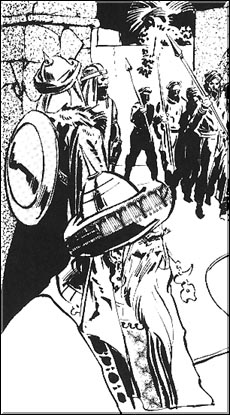
Iranistani


An eastern nation south of the Vilayet Sea, Iranistan is one of Turan's strongest rivals, grown rich on trade with Vendhya and the Black Kingdoms. Its capital, glittering Anshan, is presided over by a king and is far-famed for its cultivated court, its splendid woven carpets, and exotic delicacies (such as the pistache nut).
The Ilbars Mountains extend into Iranistan, and the Ilbarsi hillmen who inhabit the towns in these mounntains are nominally subject to the Iranistani government, though they are openly rebellious, owing allegiance to their own personal chiefs and overlords.
The Iranistani are a short, stout, broad-shouldered people. They have light brown skins, blue or brown eyes, and steely-blue hair (much like the Shemites, to whom they are distantly related).
The Iranistani people are divided into a myriad of tribes banded together against the threat of Turan. Although this common enemy gives the kingdom some strength, the varying origins of the Iranistani make the kingdom fractious.
Each tribe has ancestral lands which they have held for millennia. These lands may not be tremendously valuable, nor might they be extensive, but they represent the tribe's independent spirit. "Let the king rule in Anshan," one tribal leader has said. "These lands are ours."
Iranistan does not have a formal legal system. Minor infractions are resolved by the tribal leader, without recourse to "national" courts. In rnore significant cases, the king's word is theoretically absolute, but a tribe who disagrees with the king simply withdraws to its ancestral lands and ignores him. Depending upon the monarch and his state of mind, such withdrawals are viewed either as the right of the independent tribe, or as willful disobedience and treason. The former response usually allows for resolution of the dispute, while the latter quickly involves Iranistan's soldiers in putting down the "insurrection," further weakening the teetering nation.
The Iranistani gods comprise a myriad of tribal deities and heroes mixed with ancient sects of Hyborian or Vendhyan gods. There is no "state religion" in Iranistan; the temple district of Anshan is a confusing maze of tiny hut-shrines beside huge stone temples. The strength of a given cult is directly tied to the associated tribe's favor with the king.
Drujistan, the land of demons, is a wild and barren region of black rock in the southern Ilbars where a ghoul king once built Yanaidar, a haunted city.
One cult within the borders of Drujistan is the Yezmites, or the Sons of Yezm. This cult has its roots in the pre-Cataclysmic Society of the Hidden Ones, a sect of assassins who used their dreaded Flame Knives to sway the destiny of empires.
Yezmite assassins are blamed for the deaths of King Yildiz of Turan, King Satish of Vendhya (father of Bhunda Chand and the Devi Yasmina) and Kobad Shah of Iranistan. Their acts are marked by the stealth of their assassins and the poisoned daggers they use. The daggers have blades shaped like a many-tongued flame.
